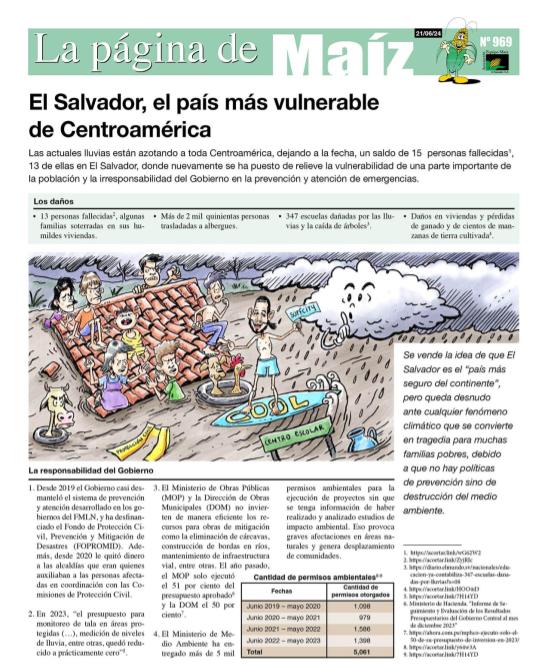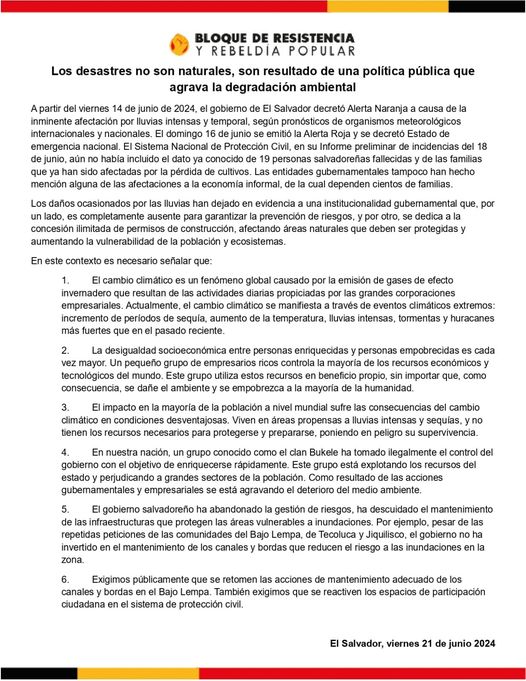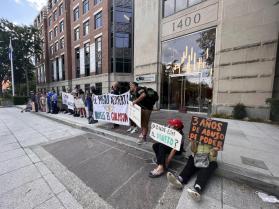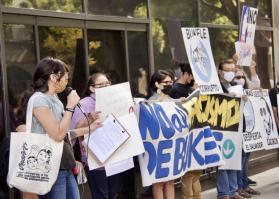"Disasters are not natural": Social movements speak out against government neglect during recent storms
Between June 16 and June 21, El Salvador, along with the rest of Central America, faced historically heavy rains as a result of a Central American gyre storm system. In El Salvador, the storm caused rivers to overflow as well as landslides, burying homes, destroying roads, and leaving a death toll of 19 in its wake. Extreme weather events are increasing in frequency and intensity in Central America as a result of climate change.
Below, we offer translations from two organizations in El Salvador explaining why government policies that encourage mega-projects and ignore basic infrastructure in marginalized communities have exacerbated the danger of extreme weather events. The first translation is a recent newsletter by Equipo Maiz, a popular education organization.
The second is a statement released by the Popular Rebellion and Resistance Bloc (BRP), a prominent leftist coalition organizing grassroots opposition to Nayib Bukele’s authoritarian rule.
El Salvador, the most vulnerable country in Central America
by Equipo Maiz popular education collective (June 21, 2024)
The current rains are battering all of Central America, leaving, as of today, a death toll of 15. 13 of those deaths are in El Salvador, highlighting, once again, the vulnerability of a large part of the population and the lack of government responsibility in preventing and responding to emergencies.
The Damage
- 13 deaths, some of which were families buried by landslides in their humble homes.
- More than 2,500 people transferred to shelters.
- 347 schools damaged by the rain and fallen trees.
- Damages to homes and loss of cattle and hundreds of acres of crops.
The government’s responsibility
- Since 2019, the government has almost fully dismantled the prevention and response system developed under the FMLN governments and has withdrawn support for the Civil Protection, Prevention, and Mitigation of Disasters Fund (FOPROMID). In addition, since 2020 federal money has been taken away from local governments, which formerly assisted, in coordination with Civil Protection Commissions, people who were affected by disasters.
- In 2023, “the budget for monitoring logging in protected areas...and rainwater measurement, among other things, was practically reduced to nothing.”
- The Ministry of Public Works (MOP) and the Municipal Works Directorate (DOM) did not sufficiently invest in mitigation measure like repairing sinkholes, constructing riverbanks, maintaining transportation infrastructure, and more. Last year, the MOP only used 51% of its approved budget, while the DOM only used 50%.
- The Ministry of the Environment has approved more than five thousand permits for projects without having carried out and analyzed environmental impact studies. This leads to serious damage in natural areas and causes community displacement.
| Dates | Number of Environmental Permits Approved |
| June 2019- May 2020 | 1,098 |
| June 2020- May 2021 | 979 |
| June 2021- May 2022 | 1, 586 |
| June 2022- May 2023 | 1, 398 |
| Total | 5,061 |
We are being sold the idea that El Salvador is the “safest country on the continent,” but the truth shines through when any weather event can become a tragedy for poor families due to the fact that there are no prevention policies, just ones that destroy the environment.

POPULAR RESISTANCE AND REBELLION BLOC
Disasters are not natural, they are the result of a public policy that exacerbates environmental degradation.
On Friday, June 14, 2024, the government of El Salvador declared an Orange Alert due to the imminent effects of heavy rains and storms, according to forecasts from international and national meteorological organizations. On Sunday, June 16, a Red Alert was declared and a National State of Emergency was announced. The National Civil Protection System, in its preliminary report of incidents of June 18, did not include the 19 deaths of Salvadorans or the families that have already been affected by crop losses. Governmental entities have not made any mention of the effects on the informal economy, on which hundreds of families depend.
The rain damage has exposed a government that, on the one hand, is completely ineffective when it comes to disaster prevention and, on the other hand, is focused on granting unlimited construction permits, compromising natural areas that should be protected and increasing the population's and ecosystem's vulnerability.
Within this context it is necessary to point out that:
- Climate change is a global phenomenon caused by the emission of greenhouse gases resulting from the daily activities of large corporations. Climate change currently takes the form of extreme weather events: increased periods of drought, higher temperatures, intense rainfall, storms, and hurricanes that are more intense than in the recent past.
- Socio-economic inequality between the rich and the poor is growing. A small group of wealthy businesspeople controls most of the world's economic and technological resources. This group uses these resources for their own benefit, regardless of the resulting environmental damage and impoverishment of the majority of humanity.
- The impact on the majority of the world's population is that they suffer the consequences of climate change under adverse conditions. They live in areas prone to rain and drought, and do not have the necessary resources to protect and prepare themselves, putting their survival at risk.
- In our nation, a group known as the Bukele Clan has illegally taken control of the government in order to quickly enrich themselves. This group is exploiting state resources and harming large sectors of the population. As a result of the actions of the government and large business owners, environmental deterioration is worsening.
- The Salvadoran government has abandoned risk management and neglected to maintain infrastructure that protects areas vulnerable to flooding. For example, despite repeated requests from the communities of the Bajo Lempa, Tecoluca, and Jiquilisco, the government has not invested in the maintenance of the canals and embankments that reduce the risk of flooding in the area.
- We publicly demand that proper maintenance be resumed for the canals and riverbanks in the Bajo Lempa. We also demand that spaces for civic participation in the civil protection system be reactivated.




